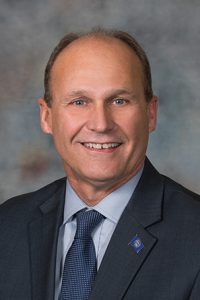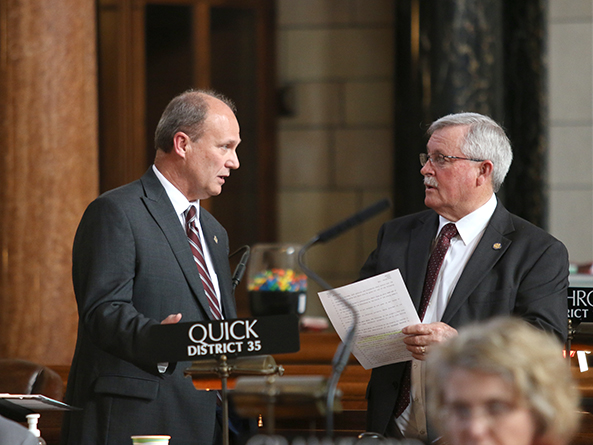Land bank bill stalls on latest attempt
A bill that would allow municipalities throughout Nebraska to create or join land banks stalled during general file debate Feb. 25.

LB424, introduced by Grand Island Sen. Dan Quick, was debated last year but did not advance from general file after a failed cloture motion. The bill would allow any municipality in Nebraska to join an existing land bank—a tax-exempt political subdivision that acquires, manages and develops vacant and tax-delinquent properties—under the Nebraska Municipal Land Bank Act.
Currently, only municipalities in Douglas and Sarpy counties are eligible under state law to create land banks. Under the bill as introduced, only a metropolitan class city could create a stand-alone land bank. Omaha is the state’s only metropolitan class city.
The bill also would specify that a land bank is prohibited from levying property taxes.
Quick said blighted properties often are too costly and time consuming for private investors to rehabilitate. Those properties not only are eyesores, he said, but the city must pay to mow lawns and provide police and fire protection for the buildings.
“They sit there and they take down the whole neighborhood,” Quick said. “It’s becoming costly for communities.”
Quick introduced an amendment, adopted 30-1, that would allow a primary class city to create a stand-alone land bank and would create a system to remove land bank board members for neglect of duty or misconduct.
Sen. John Stinner of Gering supported the bill, saying it would increase the inventory of workforce housing. He said the bill is necessary because the private sector hasn’t invested in blighted properties due to the large volume and the high cost of clearing a property’s title.
“It’s an important bill for western Nebraska and rural Nebraska as well,” Stinner said. “It’ll clean up some of these towns in disrepair and give them a competitive advantage.”
Omaha Sen. Justin Wayne introduced an amendment, adopted 33-0, that would add his LB1178 to LB424. The provisions would prohibit land banks from entering into agreements with nonprofit corporations or other private entities for purposes of temporarily holding real property for those nonprofit corporations or private entities.
Wayne said his amendment would address a specific concern regarding nonprofits in Omaha holding properties for up to five years.
“While those properties were sitting in the land bank … all the issues [of dilapidated properties] were still occurring,” Wayne said.
Bellevue Sen. Carol Blood said she supported LB424 because municipalities do not have an effective way to address blighted properties.
“We’re talking about an idea that has successfully been done across the country,” Blood said. “Michigan and New York have been able to recapture 50 percent of the taxes on properties returned to the tax rolls [within] five years.”
Sen. Steve Erdman of Bayard opposed the bill. He said he didn’t think individuals or entities would purchase properties renovated under a land bank.
“I am opposed to government owning property,” Erdman said. “If a private investor can’t take that property and make it work, why would it be that the government can do that?”
Also speaking in opposition was Sen. Mike Hilgers of Lincoln. Dilapidated properties are a problem, he said, but he asserted that the bill is too broad and contains many loopholes, including not prohibiting the immediate family of a land bank board member from benefiting from a sale.
“The conflict of interest provision also doesn’t touch, in any way, any of the investments that are authorized from the land bank,” Hilgers said.
Hilgers offered several amendments to address his objections. The first would remove from the bill a clause to enable a land bank to bid on a property that is not blighted but is adjacent to a property that the land bank already owns.
The amendment failed on a 19-24 vote. Twenty-five votes were needed.
After three hours of debate, the Legislature moved on to the next item on the agenda without voting on LB424 or any pending amendments. Per a practice implemented by Speaker Jim Scheer, the sponsor of a bill that is facing a potential filibuster must demonstrate sufficient support for a cloture motion before the measure will be scheduled for additional debate.


